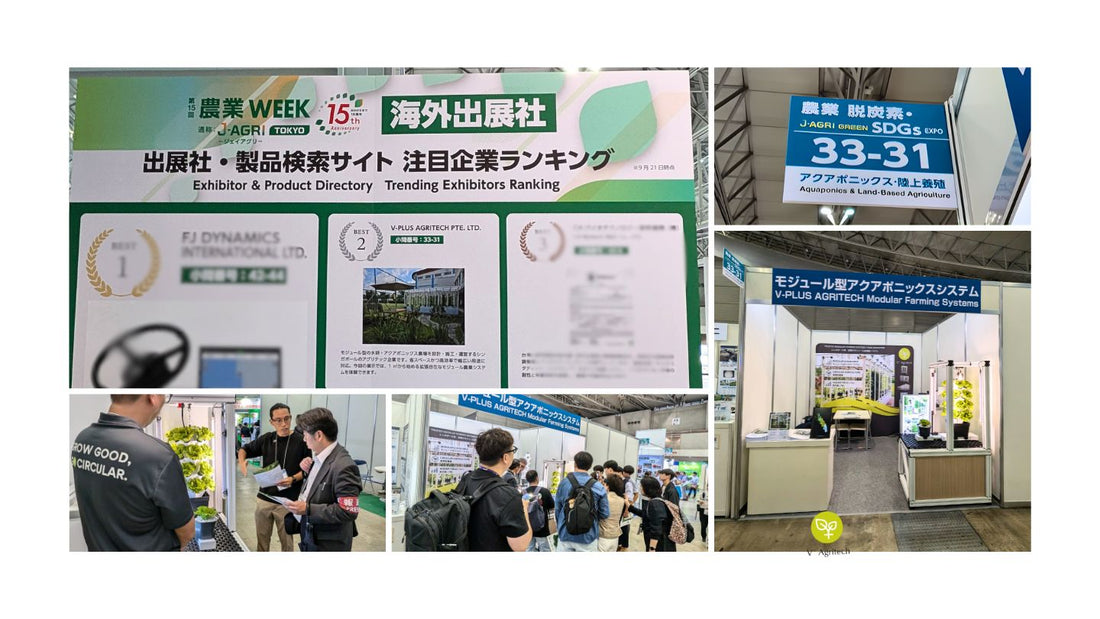J-Agri Tokyo Recap: Modular Farming that Fits Anywhere

This year at J-Agri Tokyo, V-Plus Agritech met growers, retailers, educators, and municipal leaders who shared a common goal: reliable, local harvests with less space, less water, and faster deployment. Our modular systems—designed for aquaponics or hydroponics—stood out because they scale from a single rack to multi-site networks without redesigning the whole farm.
Food Security Why Japan needs Modular Farming now - and How does V-Plus Solutions fit
Food Security
Japan’s heavy import dependence makes local supply critical. Our modular farms create reliable, nearby harvests inside retail, schools, and buildings, cutting miles and reducing waste.
Urban Farming
Space is scarce, but rooftops, basements, and back-of-house areas are underused. V-Plus modules maximize limited land and build city-level resilience with rapid deployment and predictable yields.
Aging Population
Many growers are retiring. Our ergonomic racks, automation options, and data-guided SOPs reduce physical strain and make operations accessible to newcomers and senior staff.
Education & Community
We deploy school and community micro-farms that grow food and food literacy—building talent pipelines and public buy-in.
Why this matters for Japan
Japan’s interest centered on leafy greens and herbs that scale in weeks, the feasibility of plug-and-grow pilots, and how to operate multiple small farms across urban footprints. The answer isn’t a single mega-facility—it’s a network of modular nodes that can be stood up quickly, maintained with standard operating procedures, and centrally supported.
Know anyone who might want to explore a pilot project in Kyushu or Kansai? Reach our team to plan a 6-month modular proof-of-concept with on-site training.
Launch of MicroFarm at CDL Sustainability


Photos taken from CDL's press release.
We’re thrilled to support the launch of the CDL MicroFarm, unveiled alongside the first cohort of the SME Supplier Decarbonisation “Queen Bee” programme in the real-estate sector. Read CDL’s official newsroom article here:
👉 CDL and partners celebrate the graduation of Queen Bee Programme and unveil CDL MicroFarm.
Why MicroFarm matters
-
On-site production: Ultra-fresh, pesticide-free greens harvested metres from the plate.
-
Decarbonisation pathway: Shorter supply chains, less waste, and measurable efficiency improvements.
-
Community engagement: Transparent, visible food production that educates tenants and visitors.
If you operate a commercial property and want tangible, visible sustainability that the public can experience, MicroFarm is a fast, modular way to start.
In the community: Schools and families
Marsiling Secondary School: a hands-on farm for learning


We opened a hydroponics farm at Marsiling Secondary School—a 150 square feet live classroom where students learn science, sustainability, and entrepreneurship by growing and harvesting.
🎥 Watch the reel: https://www.instagram.com/reel/DMPOHbNhFnb/?utm_source=ig_web_copy_link&igsh=MzRlODBiNWFlZA==
Why it works for schools
-
Curriculum tie-ins for science, geography, and design & tech
-
Low-maintenance modules with dosing, timers, and clear SOPs
-
Produce for canteen programs, events, or community outreach
SJII farm-to-table: parents and kids in the loop

At St. Joseph’s Institution International Preschool (SJII), families enjoyed a farm-to-table experience with their children at The Dempsey Project, discovering how aquaponics farming in the school delivers fresh and healthy produce.
🎥 Watch the reel: https://www.instagram.com/reel/DM94vgoyJp3/?utm_source=ig_web_copy_link&igsh=MzRlODBiNWFlZA==
Takeaway: When students and parents see growing systems up close, food literacy and buy-in skyrocket—and so does interest in bringing farms to campuses and neighbourhoods.
Ready to explore a site?
Contact us to map modular capacity, crops, and training for your location.

